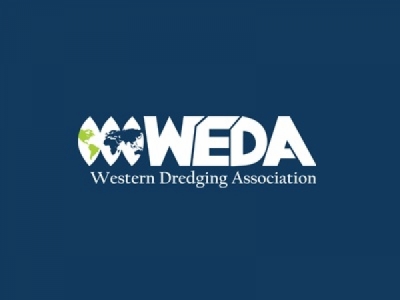
Posted on June 18, 2019
During its Annual Summit & Expo at the historic Hilton Chicago, Illinois, held from June 4-7, the Western Dredging Association (WEDA) presented two Environmental Excellence Awards, recognizing projects that demonstrate environmental awareness in each of two categories. The “Environmental Dredging” award went to the Zephyr Refinery Project and the “Mitigation and Adaptation to Climate Change” award to the La Quinta Aquatic Habitat Mitigation Project.
The prize winners fulfilled and exceeded the criteria of the Environmental Commission and made outstanding contributions to meeting the goals of WEDA, which are to “promote communication and understanding of environmental issues and stimulate new solutions associated with dredging and placement of dredged materials such that dredging projects, including navigation and environmental, are accomplished in an efficient manner while meeting environmental goals.”
The 2019 WEDA Environmental Excellence Award for Environmental Dredging was presented to the project team from EA Engineering, Science, and Technology, Inc., PBC (EA) and Sevenson Environmental Services (SES) for the dredging and restoration of the Former Zephyr Refinery: Fire Suppression Ditch project (Zephyr project). This area is located along the North Branch of the Muskegon River within the Muskegon Lake Area of Concern (AOC), Muskegon, Michigan.
For more than 40 years the Zephyr Oil Refinery operated with historic releases of petroleum and metals into the Muskegon Lake watershed. These releases contributed to significant contamination of the sediment and wetlands surrounding the site and resulted in beneficial use impairments (BUIs) to the AOC such as the loss of fish and wildlife habitat. The Zephyr project was identified in the Stage 2 Remedial Action Plan for the Muskegon Lake AOC for restoration in order to support BUI removal. Under the Great Lakes Legacy Act (GLLA), through the strong partnership between the United States Environmental Protection Agency (USEPA) Great Lakes National Program Office (GLNPO) and the Michigan Department of Environmental Quality (MDEQ), the project was completed in in late 2018.
The project provided numerous environmental benefits by remediating legacy contamination and restoring native habitat within a Great Lakes AOC, and contributing to the future removal of BUIs within the AOC. It demonstrated how innovative partnerships and contracting approaches can lead to success on many levels. The remediation will provide economic benefits to the Muskegon Lake area and Great Lakes region and the many lessons learned will be beneficial for future projects. In addition, the thorough public outreach activities – the site is located adjacent to residential areas – demonstrated the importance of engaging with residents and other concerned citizens.
In addition, sustainable approaches were implemented, including the reuse of all woody debris and trees removed during remediation on the site for habitat structures as well as leaving approximately 8% of the haul road material in place for an upcoming restoration project on the adjacent property, therefore reducing disposal quantities and reusing material in a beneficial manner.
Finally, the environmental dredging of the Former Zephyr Refinery: Fire Suppression Ditch area included many unique elements that will be transferable and adaptable to future contaminated sediment remediation and restoration projects with similar characteristics.
WEDA’s 2019 Environmental Excellence Award for Mitigation and Adaptation to Climate Change was presented to the project team of the La Quinta Aquatic Habitat Mitigation Project in the Corpus Christi Ship Channel, Corpus Christi, Texas, USA. Project team members were Luis M. Maristany, Kyle McElroy, and Aaron G. Horine, of Mott MacDonald, and Paul D. Carangelo, and Eileen Mink from the Port of Corpus Christi Authority, Texas.
As a part of the 404-permit process, the US Army Corps of Engineers (USACE) has adopted a policy requiring project impacts to be offset through in-kind mitigation. To address these requirements, the Port of Corpus Christi Authority (PCCA) was tasked with creating 6.6 acres of Smooth Cordgrass (Spartina alterniflora) habitat and 19.2 acres of Shoal Grass (Halodule wrightii) habitat as mitigation for the PCCA La Quinta Terminal Project. Meeting these mitigation requirements in semi-arid South Texas was a challenge which required careful planning, design, and construction. This challenge was approached by constructing the 200-acre Beneficial Use Site 6 (BUS-6) using new work (non-maintenance) dredged material through several phases. Throughout the course of the project, dredged material was placed into BUS-6 and reworked, dredged material from an upland dredged material placement area (DMPA) was reused, and 12.6 acres of marsh vegetation and 25.3 acres of Shoal Grass were planted. The success of the project made it one of the largest known actively planted Shoal Grass mitigation projects in Texas.
Environmentally speaking, if the marsh continues to flourish as it has, the entire site has potential to be a sink for over 420 tons of carbon per year. The project also reduces channel and turning basin siltation, which reduces maintenance dredging frequency, resulting in lower carbon emissions. From an economic perspective, by beneficially using the dredge material to construct BUS-6, dredge pumping distances were reduced because material did not need to be pumped to upland dredge disposal areas. This dramatically reduced dredging costs and increased efficiency during construction. Also, by not utilizing existing dredge disposal areas and utilizing unused material previously placed within an upland placement area, placement area capacity for future dredging projects has been preserved, which will reducing costs for these maintenance dredging operations. The project also reduces channel and turning basin siltation, thus reducing maintenance dredging costs and impacts to existing placement areas. In addition, the mitigation project facilitated the development of the La Quinta Trade Gateway which, when completed, will be a state-of-the-art multi-purpose cargo dock and container facility.
For further information contact on any of these projects: Thomas P. Cappellino, WEDA Executive Director (tcappellino@westerndredging.org) or Craig Vogt (craig@craigvogt.com)
Pictures from Chicago WEDA Annual Meeting
WEDA presents its 2019 annual environmental project award to the Zephyr Oil Refinery site project





